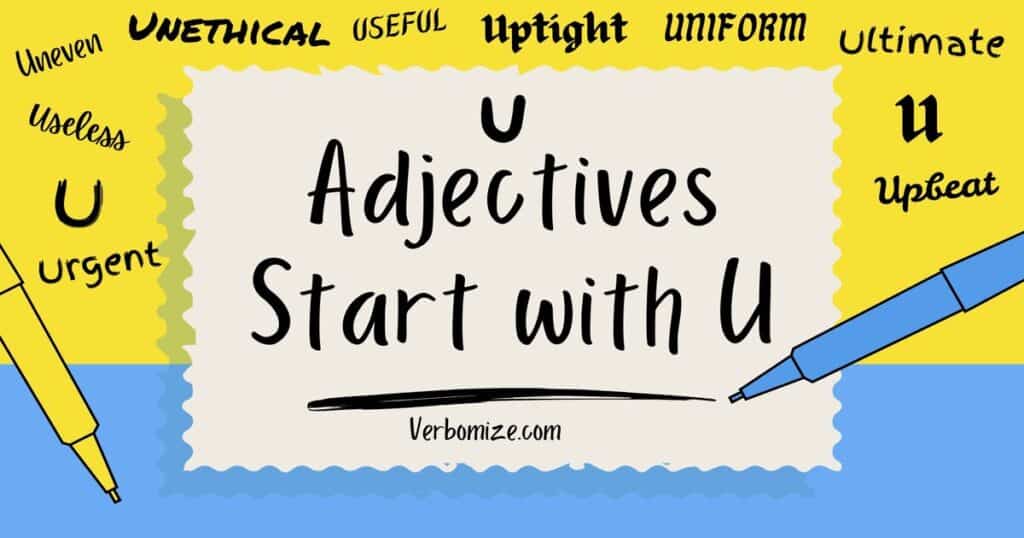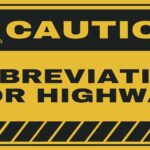Are you looking for adjectives that start with U to elevate your writing or spark your creativity? You’ve come to the right place! Whether you’re crafting a story, polishing an essay, or simply expanding your vocabulary, these unique adjectives will add color and flair to your language.
In this article, you’ll discover a variety of adjectives that start with U, each with its own distinct flavor. From the upbeat and unusual to the understated and unique, these words will help you express yourself with precision and style. Keep reading to unlock a whole new world of words!
Why Understanding Adjectives Matters
Adjectives are the building blocks of description. They help us convey precise details, evoke emotions, and paint vivid mental pictures. By expanding our vocabulary, we can express ourselves more effectively and make our writing or speech more engaging. So, if you’ve been searching for ways to elevate your language, why not start by learning some new adjectives?
Whether you’re a writer, student, professional, or simply someone looking to sound more articulate, these adjectives starting with “U” will add nuance and variety to your expression. Let’s dive in!
positive adjectives that start with u
Some adjectives with the letter “U” can carry a bright, optimistic tone, giving your language an uplifting quality. Here are some words that exude positivity:
- Uplifting: Something that inspires or elevates your mood or spirit.
- Unique: Describes something one of a kind; unlike anything else.
- Upbeat: A cheerful and optimistic attitude or vibe.
- Unbelievable: Something so extraordinary it’s hard to believe.
- Uproarious: Extremely funny or causing an uproar of laughter.
- Undefeated: Not having been beaten or overcome; often used to describe someone who remains successful despite challenges.
- Unparalleled: Without equal; matchless in quality or achievement.
- Unflappable: Calm, especially in difficult situations; someone who remains composed under pressure.
- Useful: Something that serves a practical purpose or benefit.
- Untouched: In its natural state, unaltered or pristine.
These adjectives are ideal for describing people, experiences, and things in a positive light. Whether you’re praising a person’s work ethic or highlighting an experience that changed your life, these terms will do the trick.
Neutral Adjectives Starting with U
Not every adjective needs to express emotion or opinion directly. Sometimes, it’s more about simply describing the state of things. Neutral adjectives help convey these ideas clearly without bias. Here are some examples:
- Uniform: Consistent in form or appearance; identical.
- Urgent: Requiring immediate attention or action.
- Ultimate: The final or last in a series; the best or greatest.
- Uncommon: Not frequently encountered; rare.
- Uncertain: Not definite or fixed; ambiguous.
- Unchanged: Remaining the same over time.
- Unmarked: Without visible identification or label.
- Unspecified: Not detailed or made clear.
- Uptight: Tense, anxious, or nervous in a restrained manner.
- Undetermined: Not yet decided or resolved.
These adjectives offer versatility, allowing you to describe situations, things, or characteristics in a straightforward, neutral manner without letting emotions get in the way.
negative adjectives that start with u
Unfortunately, some words starting with “U” carry negative connotations. These adjectives can describe undesirable traits, situations, or qualities that you might want to avoid. Here are some examples:
- Unreliable: Not dependable; can’t be counted on.
- Unstable: Prone to change or failure; lacking in balance or security.
- Unpleasant: Not enjoyable or agreeable.
- Useless: Having no practical value; ineffective.
- Unsuitable: Not appropriate for a particular purpose or situation.
- Unethical: Not conforming to moral principles; wrong or dishonest.
- Undesirable: Not wanted or liked; something you would prefer to avoid.
- Uneven: Lacking regularity or consistency; not level.
- Unpleasant: Causing discomfort or displeasure.
- Unfortunate: Marked by bad luck or a negative outcome.
While we don’t always like to focus on the negative, knowing these adjectives can help you describe challenges, obstacles, or undesirable scenarios more effectively.
adjectives starting with u to describe a person positively
Let’s begin by exploring adjectives that inspire positivity, enthusiasm, and motivation. These words help to convey optimism, strength, and encouragement:
- Unstoppable: Incapable of being defeated or hindered; showing relentless perseverance.
- Unmatched: Having no equal; superior in comparison.
- Ubiquitous: Present, appearing, or found everywhere, especially in a way that’s overwhelmingly positive.
- Unquestionable: Undeniably true or certain; beyond doubt.
- Upstanding: Honest and respectable; adhering to high moral standards.
- Unyielding: Not giving up or bending; persistent and determined.
- Unbeaten: Having remained undefeated or invulnerable.
- Unpretentious: Modest and down-to-earth, not seeking attention or admiration.
- Untamed: Wild, free, and unconstrained; full of life and energy.
- Undaunted: Courageous, not discouraged by challenges or difficulties.
These adjectives are perfect for describing individuals or situations that inspire admiration or represent excellence and integrity.
Descriptive Adjectives for People and Personalities
Next, let’s look at adjectives that are great for characterizing people, particularly their qualities and characteristics. These words can help you describe personality traits, behaviors, and emotional tendencies.
- Uplifted: Feeling elevated in spirit or mood; inspired.
- Uncaring: Showing indifference or a lack of concern.
- Urbane: Sophisticated and cultured, usually with a polished manner.
- Untrustworthy: Not reliable or dependable; not deserving of trust.
- Uptight: Tense, anxious, or excessively controlled in demeanor.
- Underhanded: Secretive, deceptive, or dishonest in a way that’s sneaky or unfair.
- Unassuming: Humble and modest, without any desire to show off.
- Unreliable: Not dependable or consistent; frequently letting others down.
- Unfathomable: Difficult or impossible to understand or comprehend.
- Untenable: Unable to be defended or justified; unsustainable.
These adjectives are useful when you’re assessing personality traits, whether they are admirable or in need of improvement.
Adjectives Describing States or Conditions
Some adjectives describe specific conditions or states of being, which are essential for clarity in both written and spoken language. These terms can help to convey the nature of something’s current situation or status.
- Unstable: Lacking stability; prone to change or collapse.
- Undesirable: Not wanted or preferred; something you would rather avoid.
- Unfit: Not in good health or condition; unsuitable for a particular purpose.
- Unstable: Prone to change or fluctuating unpredictably.
- Unchanged: Remaining the same over time without alteration.
- Unequal: Not the same in quantity, size, or quality.
- Unbroken: Not cracked or damaged; still intact or unscathed.
- Unfinished: Not yet completed; still in progress.
- Untested: Not proven or tried; in need of evaluation or examination.
- Unattainable: Impossible to achieve or reach.
These adjectives are particularly effective for describing situations, circumstances, or the status of an object or event.
Adjectives to Express Intensity or Extremes
In some contexts, you may need to emphasize the extremity or magnitude of something. Here are some adjectives that capture intensity, whether in magnitude or feeling.
- Unbelievable: So extraordinary or improbable it’s hard to accept as true.
- Unbearable: Too intense or extreme to endure or tolerate.
- Uncontrollable: Not able to be managed or restrained; wild.
- Unimaginable: Beyond what can be conceived or thought possible.
- Unthinkable: Too extreme or absurd to consider; inconceivable.
- Unfathomable: Impossible to measure or comprehend, often used for depth or complexity.
- Unquenchable: Impossible to satisfy, especially in terms of thirst or desire.
- Unrelenting: Not yielding or giving up; showing no signs of weakening.
- Uncompromising: Not willing to adjust or negotiate; steadfast in one’s position.
- Unstoppable: Impossible to prevent or stop; relentless.
These adjectives are ideal for describing feelings, actions, or phenomena that cannot be controlled or subdued.
Adjectives for Describing Objects or Things
There are also several adjectives that focus on describing objects or things—these words help to communicate how items appear or function in various situations.
- Unpolished: Not refined or finished; lacking a smooth or glossy surface.
- Underwhelming: Failing to impress or meet expectations.
- Unusual: Out of the ordinary; uncommon or rare.
- Unattractive: Lacking appeal or aesthetic quality.
- Unassuming: Not drawing attention to oneself; modest in appearance.
- Unfinished: Incomplete or not yet fully developed.
- Unyielding: Rigid, hard, or resistant to change or pressure.
- Unsophisticated: Simple and not refined; lacking complexity.
- Underestimated: Not given enough credit or value, often implying more potential.
- Unattractive: Not appealing to the eye; aesthetically unpleasing.
These words help to describe the visual, functional, or emotional impact of things and objects, adding clarity to your descriptions.
Adjectives Depicting Difficulties or Obstacles
Sometimes, life throws challenges our way. These adjectives are great for describing situations or conditions that involve difficulty, resistance, or hardship.
- Unmanageable: Difficult to control or deal with, often due to complexity or size.
- Uncooperative: Not willing to work with others or be helpful.
- Unapproachable: Difficult to engage with or talk to; distant or aloof.
- Unfortunate: Having an unlucky or regrettable outcome.
- Unlikely: Not probable or expected to happen; implausible.
- Unsolvable: Impossible to resolve or fix.
- Undue: Excessive or disproportionate, especially in terms of effort or emotion.
- Unsuccessful: Not achieving the desired outcome or goal.
- Untrustworthy: Lacking reliability or honesty; prone to deceive.
- Uncomfortable: Causing physical or mental discomfort.
These adjectives are useful when discussing challenges, hurdles, or situations that require attention or intervention.
Adjectives to Describe Mood or Emotion
Our moods and emotions shape how we interact with the world. These adjectives help convey various emotional states or feelings, whether you’re feeling joyful, distressed, or anything in between.
- Uplifted: Feeling elevated or inspired, often due to positive influences.
- Uneasy: A sense of discomfort or anxiety, often due to uncertainty.
- Underwhelmed: Disappointed or unimpressed by something that doesn’t meet expectations.
- Unnerved: Feeling anxious or frightened due to an unsettling situation.
- Uproarious: Full of uproar or loud laughter, typically in a fun or chaotic way.
- Unsettled: Feeling disturbed, uncomfortable, or in a state of confusion.
- Unamused: Not finding something funny or entertaining.
- Unhinged: Exhibiting extreme or irrational emotions, often marked by mental instability.
- Unrelieved: Experiencing continued discomfort or distress without relief.
- Uplifting: Creating a sense of joy, hope, or optimism.
These adjectives are ideal for expressing how people feel, whether in moments of joy, anxiety, or disappointment.
Adjectives to Express Uniqueness and Distinction
Sometimes we need adjectives to highlight the distinctiveness of people, places, or things. These words help us communicate qualities that set something or someone apart from the ordinary.
- Uncommon: Rare, unusual, or not frequently encountered.
- Unrepeatable: So unique that it cannot be replicated or duplicated.
- Unparalleled: Having no equal; superior in comparison.
- Unmistakable: So clear or obvious that it cannot be confused with anything else.
- Unusual: Out of the ordinary; different from what is typical.
- Unobtrusive: Not drawing attention; discreet and unobvious.
- Unfashionable: Out of style or not in trend.
- Untouchable: Too remarkable or esteemed to be affected or influenced.
- Unconventional: Not conforming to accepted standards or traditions.
These adjectives will help you emphasize qualities of rarity, distinction, or uniqueness when describing people, experiences, or objects.
Adjectives to Describe Physical Characteristics
When you’re describing people or objects, physical attributes often take center stage. These adjectives help convey different aspects of appearance, size, and form.
- Uptight: Rigid, tense, or tightly controlled in posture.
- Undistinguished: Lacking notable features; not standing out in appearance.
- Upright: Standing tall or straight; not leaning or bent.
- Unattractive: Lacking visual appeal or beauty.
- Unpolished: Lacking refinement or a smooth finish; raw in appearance.
- Undecorated: Not adorned or embellished; simple or plain.
- Unkempt: Disheveled or messy in appearance; untidy.
- Unscathed: Remaining unharmed or uninjured.
- Unsightly: Unpleasant or unattractive to look at.
- Unobtrusive: Not noticeable or attention-grabbing in terms of appearance.
These adjectives are ideal for describing how things or people look, whether you’re focusing on their cleanliness, uniqueness, or physical state.
Adjectives for Situations or Circumstances
Sometimes, you need adjectives that speak to a situation or state of affairs. These terms help communicate the nature of circumstances or events, whether positive, neutral, or negative.
- Urgent: Requiring immediate attention or action; pressing.
- Unfavorable: Not beneficial or supportive; adverse.
- Unrealistic: Not grounded in reality; improbable or overly ambitious.
- Uneventful: Lacking noteworthy events; quiet or mundane.
- Unfortunate: Marked by bad luck or a negative outcome.
- Unfinished: Not yet completed; still in progress.
- Unresolved: Not settled or concluded; still open or pending.
- Uncertain: Lacking certainty or clarity; ambiguous.
- Unstable: Prone to change or instability; insecure.
- Unmanageable: Difficult or impossible to control, often due to complexity or magnitude.
These adjectives are useful for providing context to different situations, whether you’re talking about urgent deadlines or unfinished business.
Adjectives for Describing Quality or Level
These adjectives help to communicate the quality or level of something, whether high or low, good or bad, and everything in between.
- Unequal: Not the same in quality, size, or value; imbalanced.
- Underrated: Not given enough recognition or credit for its true value.
- Uptight: Tense or stressed; unable to relax.
- Unrefined: Lacking in sophistication or polish; raw or rough.
- Unsurpassed: Better than anything else; unmatched in quality or ability.
- Underrun: Below expected or normal levels; insufficient.
- Unexceptional: Not outstanding or extraordinary; ordinary.
- Unattainable: Impossible to achieve or reach, often due to being out of reach.
- Unworthy: Not deserving of something; lacking merit.
- Unbeatable: So good that no one can defeat or surpass it.
These adjectives are fantastic for expressing levels of achievement, quality, and value.
Adjectives for Negative Traits or Behaviors
Some adjectives help describe negative traits or actions, providing a way to characterize undesirable behavior or attributes in people or things.
- Unethical: Not conforming to moral standards; morally wrong.
- Untrustworthy: Not deserving of trust; unreliable.
- Unreliable: Unable to be depended upon; inconsistent.
- Undisciplined: Lacking self-control or proper behavior.
- Unscrupulous: Lacking moral principles; dishonest or unethical.
- Unjust: Lacking fairness or justice; inequitable.
- Uncooperative: Not willing to work with others or collaborate.
- Unkind: Lacking in compassion, generosity, or consideration.
- Unapproachable: Difficult or unfriendly to approach; aloof.
- Uncaring: Showing a lack of concern or empathy.
These adjectives are helpful when you want to describe less-than-ideal traits or behaviors in individuals or actions.
Adjectives to Express Speed or Movement
Some situations or objects require adjectives that describe the speed or movement of something. These words can convey how quickly or slowly something happens or moves.
- Unhurried: Taking time; not rushed or fast-paced.
- Unfastened: Not secured or locked in place, often referring to movement or a lack of restraint.
- Unrushed: Not hurried; relaxed and slow-paced.
- Unfettered: Free from restraints; not bound or restricted in movement.
- Unstoppable: Moving or progressing with great speed or force, unable to be slowed or stopped.
- Uprooted: Moved or displaced with force; often used to describe rapid displacement.
- Unfolding: Developing gradually or revealing itself over time.
- Unceasing: Not stopping; continuous or constant in motion.
- Unwinding: Moving or progressing slowly in a relaxed manner.
- Unfurling: Spreading out or opening, typically used for things like flags, sails, or flowers.
These adjectives help when you need to describe motion, movement, or the pace at which something happens.
Adjectives for Describing Sounds or Noise
In some contexts, it’s important to convey the quality or nature of sounds. These adjectives help describe how something sounds, whether it’s loud, soft, pleasant, or otherwise.
- Unheard: Not heard or unnoticed by others.
- Unmusical: Lacking harmony or rhythm; unpleasant to hear.
- Uproarious: Making an extremely loud, chaotic noise, often used in a humorous context.
- Unmelodic: Lacking melody or harmony; discordant.
- Unobtrusive: Quiet or subtle, not drawing attention through sound.
- Unpleasant: Not pleasing to the ear; harsh or grating.
- Unvocal: Silent or not expressing any sound.
- Unquiet: Making noise or creating a disturbance; not calm or peaceful.
- Unechoing: Lacking reverberation or echo.
- Undisturbed: Free from noise or interruption; quiet and peaceful.
These adjectives can be especially useful for describing sounds or the atmosphere created by noise in a given environment.
Creative Ways to Use “U” Adjectives in Writing and Speech
Now that you’re familiar with some fantastic adjectives starting with “U,” it’s time to integrate them into your vocabulary. Here are a few tips on how you can use them to enrich your writing and communication:
- In Descriptive Writing: Use positive adjectives like “unique” and “unbelievable” to add flair to your descriptions. For instance, you could write, “The view from the mountaintop was absolutely unbelievable—a unique sight that made the arduous climb worthwhile.”
- In Daily Conversations: Mix in adjectives like “upbeat” or “unflappable” when describing people. “My colleague is incredibly upbeat even when under pressure, always keeping the atmosphere unflappable during stressful meetings.”
- For Persuasive Writing: If you’re trying to convince someone of a particular idea, adjectives like “unparalleled” and “ultimate” can be powerful. “This is the ultimate solution to your problem, offering unparalleled efficiency and ease of use.”
Wrapping Up
Expanding your vocabulary is an ongoing journey, and knowing adjectives that start with “U” will help you become more precise, expressive, and confident in your communication. By weaving these words into your daily interactions, whether in professional emails, creative writing, or casual conversations, you’ll quickly notice a positive shift in how your thoughts and ideas come across.
As you work on mastering these adjectives, challenge yourself to look for opportunities to use them. What can you describe in a new, more vibrant way? Which of these words will become your new favorites?
The more you use these adjectives, the more natural they’ll feel, adding richness to your language and elevating your communication skills. So, why not start today? Try using one of the adjectives you’ve learned and see how it enhances your next conversation or piece of writing!
MCQs Quiz: Unique Adjectives Start with U
This quiz is based on the adjectives starting with the letter “U” that were discussed in the article. Choose the correct answer for each question. Answers are provided after each question.
1. Which of the following adjectives describes a person who is “not willing to work with others or collaborate”?
A) Uncommon
B) Uncooperative
C) Unassuming
D) Unbeatable
Answer: B) Uncooperative
Explanation: “Uncooperative” refers to someone who is not willing to collaborate or work together.
2. Which adjective means “unable to be defeated or stopped”?
A) Unstable
B) Unstoppable
C) Unassuming
D) Unrelenting
Answer: B) Unstoppable
Explanation: “Unstoppable” refers to something or someone that cannot be stopped, typically because of their power or persistence.
3. What does the adjective “underrated” mean?
A) Lacking refinement
B) More valuable or impressive than people think
C) Unlikely to succeed
D) Too ordinary to stand out
Answer: B) More valuable or impressive than people think
Explanation: “Underrated” refers to something or someone that is not given enough credit or recognition for its true value.
4. Which adjective would you use to describe a situation that is “lacking noteworthy events; quiet or mundane”?
A) Unfathomable
B) Uneventful
C) Unmanageable
D) Unremarkable
Answer: B) Uneventful
Explanation: “Uneventful” describes a situation where nothing significant happens; it’s quiet or mundane.
5. Which adjective is used to describe something that is “not pleasing to the ear; harsh or grating”?
A) Unmusical
B) Unmelodic
C) Unpleasant
D) Unheard
Answer: C) Unpleasant
Explanation: “Unpleasant” refers to something that is not pleasing or comfortable to hear.
6. If something is “so unique that it cannot be replicated or duplicated,” which adjective best describes it?
A) Unrepeatable
B) Uncommon
C) Unstoppable
D) Unmistakable
Answer: A) Unrepeatable
7. Which adjective means “marked by bad luck or a negative outcome”?
A) Unfortunate
B) Unstable
C) Unfavorable
D) Uncompromising
Answer: A) Unfortunate
Explanation: “Unfortunate” is used to describe something that has an unlucky or regrettable outcome.
8. Which of the following adjectives would describe a person who is “lacking moral principles; dishonest”?
A) Unreliable
B) Unethical
C) Untrustworthy
D) Unkind
Answer: B) Unethical
Explanation: “Unethical” refers to behavior that is morally wrong or dishonest.
9. What does the adjective “unobtrusive” mean?
A) Not noticeable or attention-grabbing
B) Lacking in sophistication
C) Impressive in appearance
D) Too loud or disruptive
Answer: A) Not noticeable or attention-grabbing
Explanation: “Unobtrusive” describes something that does not attract attention; it’s subtle and discreet.
10. Which adjective would describe something that is “too extraordinary to believe or accept”?
A) Unfathomable
B) Unbelievable
C) Unattainable
D) Unmanageable
Answer: B) Unbelievable
Explanation: “Unbelievable” refers to something so extraordinary or improbable that it’s hard to accept as true.
11. Which adjective refers to someone or something that is “free from restraints; not bound or restricted in movement”?
A) Unstoppable
B) Unfettered
C) Uncontrolled
D) Unrushed
Answer: B) Unfettered
Explanation: “Unfettered” refers to being free from constraints or restrictions, allowing movement or action.
12. Which adjective best describes a situation that is “difficult or impossible to manage, typically due to complexity”?
A) Unmanageable
B) Unreasonable
C) Unbeatable
D) Undistinguished
Answer: A) Unmanageable
Explanation: “Unmanageable” refers to something that is too difficult to control or deal with, usually due to its complexity.
13. What adjective would you use for something that “cannot be resolved or fixed”?
A) Unfinished
B) Unsolvable
C) Unsettled
D) Uncontrollable
Answer: B) Unsolvable
Explanation: “Unsolvable” refers to something that cannot be resolved or fixed due to its inherent difficulty.
14. Which of the following adjectives describes something that is “not conforming to accepted standards or traditions”?
A) Unpredictable
B) Unconventional
C) Unruly
D) Unusual
Answer: B) Unconventional
Explanation: “Unconventional” refers to something that does not conform to usual or traditional standards.
15. If something is described as “unparalleled,” what does that mean?
A) Of a quality that cannot be compared to anything else
B) Of a standard that can be easily surpassed
C) Of a disappointing or unsatisfactory nature
D) Of a lower quality than expected
Answer: A) Of a quality that cannot be compared to anything else
Explanation: “Unparalleled” means something that is unmatched or without equal in quality or ability.

Jone Smith is an experienced blogger and content creator behind Verbo Mize. With a passion for storytelling and insightful commentary, Jone brings a wealth of knowledge on diverse topics. His expertise in blogging, combined with a keen eye for detail, makes his work both informative and engaging, offering readers valuable perspectives on a wide range of subjects.







